1824: The Gate Incident
January 18, 2021
By AHNZ
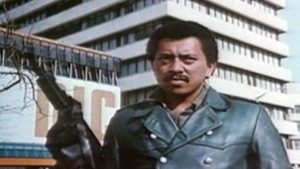 The Gate Incident occurred on January 12th, 1824, at the Paihia Mission. It was a mighty battle of wills between two wizards, one Maori and the other English. They were Tohitapu of Ngati Whatua and Henry Williams of the Church Missionary Society.
The Gate Incident occurred on January 12th, 1824, at the Paihia Mission. It was a mighty battle of wills between two wizards, one Maori and the other English. They were Tohitapu of Ngati Whatua and Henry Williams of the Church Missionary Society.
“Wizard” is a perfectly proper term for for a Missionary priest and a Maori tohunga. Both were witchdoctors after their own cloth who had their own gods and beliefs and spells. Only a theist with a particular bias would seek to privilege either of these religions over the other. So, both men were leading instruments of their particular faiths and cultures. The fight was between two wills, two means of getting needs met, not physical combat, to establish whose power was the greater.
I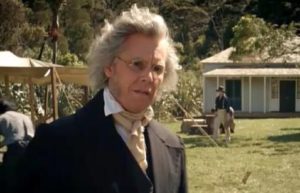 n one corner we have Henry Williams, exponent of English Christianity. Apart from his Anglican training, Williams’ character was forged as a sailor of the British Navy of lieutenant rank. New Zealand had been on the back-burner while Williams (and others) fought the Napoleonic Wars but having won those it was time to sort these souther islands out! Williams’ new fight would be to bring the benevolent force of Dignity Culture English Christian to the salvation of the antipodean savages.
n one corner we have Henry Williams, exponent of English Christianity. Apart from his Anglican training, Williams’ character was forged as a sailor of the British Navy of lieutenant rank. New Zealand had been on the back-burner while Williams (and others) fought the Napoleonic Wars but having won those it was time to sort these souther islands out! Williams’ new fight would be to bring the benevolent force of Dignity Culture English Christian to the salvation of the antipodean savages.
“At the massacre, in 1772, of French sailors belonging to the squadron of Commodore Dufresne Marion, the body of the captain fell to Tohitapu’s share, and was eaten by him accordingly. He was a man of unusual ferocity, even for a Maori of those days.”- Carleton (1874)
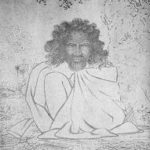 Going up against the new guy (Williams having arrived the year before, 1823,) was Chief Tohitapu of the Te Roroa tribe. Also a tohunga/priest/wizard of considerable talent. Physically huge, he was in the prime as an elder having apparently been alive to help massacre and eat Marion Du Fresne and his men. So, like Williams, Tohi had also cut his teeth on slaying Frenchmen.
Going up against the new guy (Williams having arrived the year before, 1823,) was Chief Tohitapu of the Te Roroa tribe. Also a tohunga/priest/wizard of considerable talent. Physically huge, he was in the prime as an elder having apparently been alive to help massacre and eat Marion Du Fresne and his men. So, like Williams, Tohi had also cut his teeth on slaying Frenchmen.
Somehow Tohi was safe from the massively powerful warlord Hongi Hika who presided over the region and was political master of Williams and Tohi both. We must conclude that Tohi had submitted his allegiance to Hika, becoming his vassal. Tohi’s Te Roroa tribe was a part of the larger group, the Ngati Whatua who were deadly enemies of Hika’s Nga Puhi tribe. Hika’s warriors had failed to destroy Ngati Whatua a few years before but would succeed in 1825, making an abandoned wasteland of Ngati Whatua’s former territories. Tohi would survive the crushing of the Ngati Whatua by choosing the right chief to submit to and perhaps Hika benefited by Tohi providing some buffer for him from the undefeated Whatua.
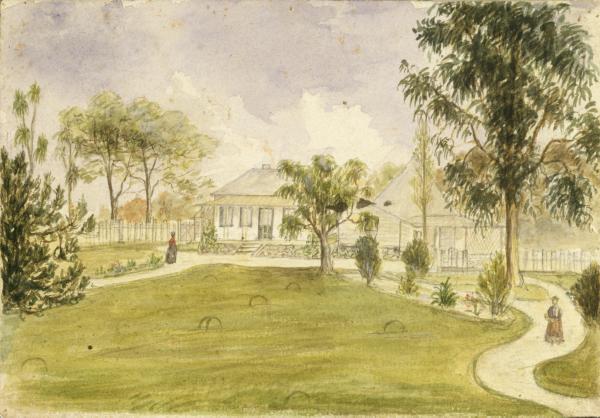 Tohi, then, was a powerful wizard and chief but he was not his own man. He had become a vassal, a Slave Culture chief whose survival depended on the favours of a giver. He had learned wizard spells of simpering and tantrums, even tantrums, to get his needs met. Tohi’s Ngati Whatua who did not follow this path of submission nor join Hika’s superarmy would be killed¹. The showdown between Dignity Culture Priest and Slave Culture Tohunga began at the CMS mission house at Paihia (image left.)
Tohi, then, was a powerful wizard and chief but he was not his own man. He had become a vassal, a Slave Culture chief whose survival depended on the favours of a giver. He had learned wizard spells of simpering and tantrums, even tantrums, to get his needs met. Tohi’s Ngati Whatua who did not follow this path of submission nor join Hika’s superarmy would be killed¹. The showdown between Dignity Culture Priest and Slave Culture Tohunga began at the CMS mission house at Paihia (image left.)
Wizards Duel
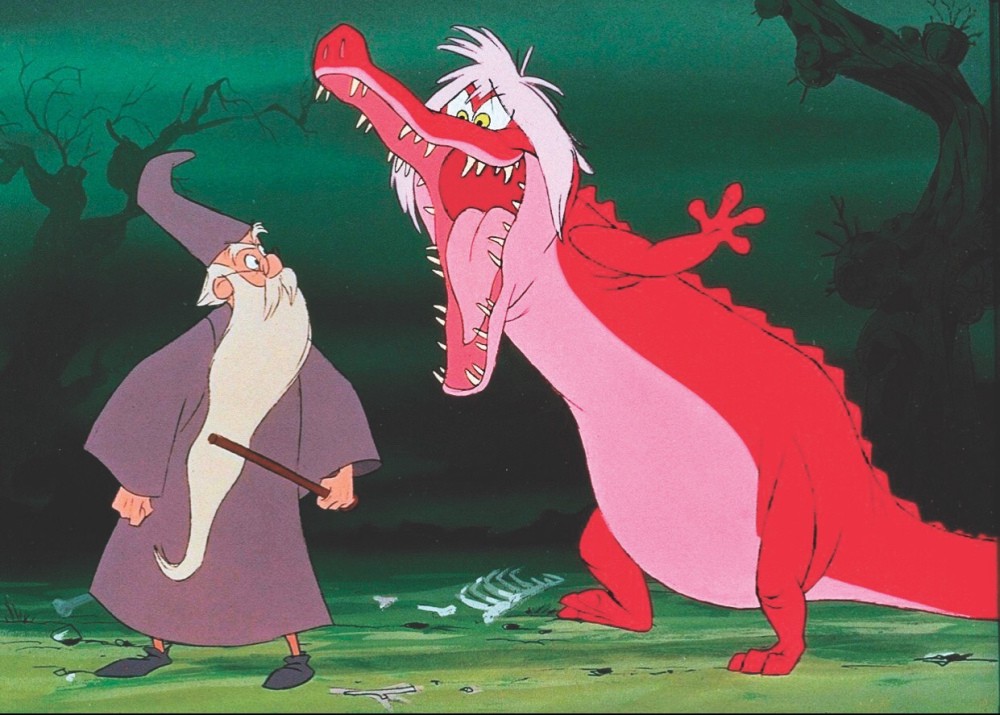 On 12 January, 1824, Tohitapu came to the mission house during Williams’ absence. His opening move was to leap over the locked gate rather than knock and wait to be welcomed in. The Missionaries at once establish a personal boundary by reminding the chief the proper gentlemanly conduct. This is the essential first response, to have force of character and assertiveness enough from the get-go so as not to be walked all over in a slippery slope to being totally dominated.
On 12 January, 1824, Tohitapu came to the mission house during Williams’ absence. His opening move was to leap over the locked gate rather than knock and wait to be welcomed in. The Missionaries at once establish a personal boundary by reminding the chief the proper gentlemanly conduct. This is the essential first response, to have force of character and assertiveness enough from the get-go so as not to be walked all over in a slippery slope to being totally dominated.
Tohi makes his next move, stamping about like a madman and posturing with his mere and spear, fainting an attack on Mr Fairburn who had met him at the gate. This was to draw spectators in because Tohi’s spells (aka social psychology) worked better in front of a live audience. He also attracts Henry Williams. The duel is on.
Tohi offered to shake hands with Williams, a ploy which would condone his behaviour so far and establish a precedent for later. It would have been so easy for Williams to have taken that hand, de-escalated the situation in the short-run, and moved on with the day. Instead, Williams refused and said the conduct was bad. With Fairburn, Williams proceeded to ignore Tohi even as he stripped down to the minimal clothing associated with the beginning of battle. The Mission men ignore Tohi and his show of threat to the house’s women and children so much that they leave, going to the beach. Round One goes to the Missionaries as Tohi ceased, sitting down to catch his breath.
“…when Mr. Williams appeared, he couched and aimed his spear at him. Mr. Williams advanced towards him, not heeding his threats, but, though Tohi trembled with rage, he did not throw the spear. He said he had hurt his foot in jumping over the fence, and demanded payment for it…”- Marianne Williams’ journal, quoted in Carleton (1874)
When Williams returned, Tohi wasn’t far behind in making another appearance. Tohi bounded over the gate again and again posed to spear Williams who ignored the deadly weapon like some passing butterfly, much to Tohi’s rage. Round 2 to the Missionary.
Tohi changed tack now, claiming to have wounded his foot in the gate-hopping and asking for compensation. Would this little spell, this rationale, find a chink in Williams’ defences? Not at all.
The Maori now tried to steal an old iron pot, another test. Would Williams be passive, drop his assertiveness in return for a pot and a little temporary peace? No, “Kati, emara, heoi ano!” [“Gently, sir, that is enough!”] said the Missionary as he and others took back the pot with a proportionate response of force.
“The agility of this huge man astonished me. He ran to and fro with his spear in his hand, something like a boy playing at cricket, except that the New Zealander dances sideways, slapping his sides, and stamping with a measured face and horrid gestures, every now and then squatting down and panting, as if trying to excite his own rage to the utmost before he made a fatal spring.”- ibid
Tohi fell back on his sore foot tactic while he re-grouped his thoughts for a new strategy. ‘I will,’ he said, ‘come here every day.’ ‘I will bring 10, 20, 30 men. I’ll burn this house down!’ The chief was trying to impress that the long-run belonged to him, he was committed to winning and he had better be bought off now. Williams, who believed in an eternal afterlife, was a long-run thinker and not perturbed at all.
 The chief was running out of ideas. These sorts of tactics had been honed on lesser men than these Missionaries. In the Kendall years the Maori had come to dominate the Missionaries, to break them, to domesticate them. The Maoris had learned that threats and tantrums and hurt feet were as good as gold for extracting wealth. Eventually the Kendalls broke out of this captivity, they had never put up such a fight as Williams and his people.
The chief was running out of ideas. These sorts of tactics had been honed on lesser men than these Missionaries. In the Kendall years the Maori had come to dominate the Missionaries, to break them, to domesticate them. The Maoris had learned that threats and tantrums and hurt feet were as good as gold for extracting wealth. Eventually the Kendalls broke out of this captivity, they had never put up such a fight as Williams and his people.
Tohi next advertised his foot through the house’s window, demanding payment for injuries sustained during his trespass. Williams’ response was that the best Tohi would get is welcome and a breakfast if he would only come back in the morning, knocking at the gate like a gentleman. Triggered, Tohi was having an existential crisis now; His spell was not working! Again, he threatened to occupy for days and to burn the house, again he stripped for fighting and paced about to no affect.
 The great Maori priest now dropped his H-bomb, his karakia spell to bewitch the Missionaries with the chants of a witchdoctor that would kill them. Such superstitions were no match for the people of the Book. As morning dawned the Missionaries sent Tohi, sitting in his “sullen majesty,” a pot of tea to sustain him. This was a humanitarian thing to do, like offering support and understanding to a child even though they’re in the midst of a tantrum. Or, it’s like John Galt in Atlas Shrugged offering technical assistance to his captors when their torture machine glitches out.
The great Maori priest now dropped his H-bomb, his karakia spell to bewitch the Missionaries with the chants of a witchdoctor that would kill them. Such superstitions were no match for the people of the Book. As morning dawned the Missionaries sent Tohi, sitting in his “sullen majesty,” a pot of tea to sustain him. This was a humanitarian thing to do, like offering support and understanding to a child even though they’re in the midst of a tantrum. Or, it’s like John Galt in Atlas Shrugged offering technical assistance to his captors when their torture machine glitches out.
“When failure became evident, the bystanders came to the conclusion that the white man’s atua [divinity] had overpowered that of the Maori..”
“But, after having been fairly worsted in the struggle, he became a staunch friend. A Maori seldom bears malice; he respects you, and likes you better for having beaten him.”
The duel was done, the Maori bested. This was a force for cultural change at the Mission, a win for Dignity Culture and for Williams and for Christianity. Tohi now became a gentleman on Missionary terms. He could rest. William and his family, on the other hand, would have other such battles and they wouldn’t have to wait long for the next one. The job of civilising was hard enough for them, without having also to undo the bad work of a decade of Kendall’s back-sliding.
The Modern Maori Tantrum
 Despite William’s advances so many years ago, there will always be another Kendall. It’s such a slippery slope, to make short-term peace by giving up a little value here and now. The trouble is, this incentivises the behaviour. When someone learns they can throw tantrums as a means of production to extract wealth that can easily become their primary vocation. This sort of thing happens in New Zealand history all the time……
Despite William’s advances so many years ago, there will always be another Kendall. It’s such a slippery slope, to make short-term peace by giving up a little value here and now. The trouble is, this incentivises the behaviour. When someone learns they can throw tantrums as a means of production to extract wealth that can easily become their primary vocation. This sort of thing happens in New Zealand history all the time……
“Smith, 60, known for roles in films including Once Were Warriors, The Piano and The Quiet Earth, who has been undergoing dialysis for four years, said he had been refused further treatment..”
“Dialysis patients were given a cup of coffee and two biscuits when they arrived for treatment, Smith said, and he had objected when he was given one whole biscuit and the remains of a broken one.”
“Surely someone can do something about this. Why doesn’t someone say, ‘Give the man a biscuit and shut up’?”- Once Were Warriors actor’s hospital ban after biscuit dispute; Newstalk ZB
In much the same territory where Tohitapu fought his duel, Pete Smith has taken on the Northland DHB is a sort of re-enactment of The Gate Incident. Putting his dialysis treatment, therefore his life, on the line, Smith took a stand over his claimed right to attack and abuse the hospital staff who were keeping him alive. The sick Smith is alleged to have thrown furniture and curses at his nurse, all of which could be pacified by surrendering on the part of the hospital if they would just give him one more biscuit.
Like Tohitapu in 1824, Smith must have not had to face someone like Henry Williams in his life before. Tantrum scenes, threats, violence, and media outbursts had evidently been successful strategies for Smith up to this point. His parents and family must have rewarded that behaviour, as Kendall did for his Maoris, to the point where men like Tohi and Smith had mastered the art of pulling their strings. Being a narcissist tends to be a very useful qualification for all actors because they can keep on playing a fantasy part in the unnatural position of a set, blind to all the cameras and lights and crew. The challenge for Smith in his old age is to find the path of Tohitapu when he was an old man. It’s also the challenge of Maoridom as a whole that has been prolonged by opportunistic Kendall-like governments who constantly enable takers to jump the fence and demand one more biscuit.
—
1 Survivors ran in many directions. Some run to the William Hobson Gang for protection from Hika, selling their previous holdings to him in return; These holdings we now call Auckland.
Ref. The Life of Henry Williams, H Carleton (1874); ENZB
Image ref. Pete Smith in Quiet Earth (1985); IMDB
Image ref. Watercolour painting by Henry Williams of the CMS mission house at Paihia, Alexander Turnbull Library; Wiki
8 thoughts on "1824: The Gate Incident"
Leave a Reply
 Like Comment Share
Like Comment Share


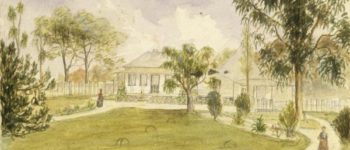




Great post. I think in life you have to choose your battles well, and you have to choose them early, as the case of Henry Williams.
Choosing a battle to which you have conceded in the past makes the coming battle extremely difficult, that’s the position we find ourselves in today.
You are a bit harsh on Kendall. Henry Williams came about 8 years after Kendall and had the benefit of the early missionaries’ experience.
Great stuff, keep it up.
I’ll make it up to him one of these days.
. ” So, like Williams, Tohi had also cut his teeth on slaying Frenchmen.”
“He said he had hurt his foot in jumping over the fence, and demanded payment for it…”- Marianne Williams’ journal, quoted in Carleton (1874)”
Well researched…brilliantly insightful.
Much thanks.
I was thinking of Lianne Dalziel and the CCC as i read that.
Oh, I think LD knows what she’s doing. She’s a player.